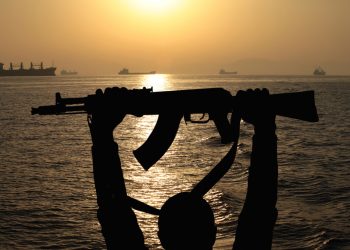The Standard P&I Club has issued a security update regarding the High Risk Areas as there is still threat threats from piracy and armed robbery in the Gulf of Guinea and Southeast Asia.
Gulf of Guinea
According to the IMB Piracy Reporting Centre, attacks in the Gulf of Guinea comprised a significant percentage of reported incidents this year, with Nigeria alone accounting for a tenth of reported incidents from January to September 2015. Occurrences reported to the IMB indicate that the affected area is substantial, with anchorages and approaches to the ports of Conakry at the Ivory Coast and Lagos in Nigeria being key hotspots. Ships waiting for berths are often vulnerable to attack, especially at night.
With 26 reported incidents in 2015, piracy and armed robbery attacks in the waters off West Africa have become a familiar activity which has become increasingly violent. In order to combat such attacks, the international shipping community provided updated guidance for West African piracy in the form of the Interim Guidelines for Owners, Operators and Masters for Protection Against Piracy in the Gulf of Guinea Region in October 2014. The document is available here; these guidelines should be read in conjunction with BMP4.
The adaptive nature of piracy networks in the Gulf of Guinea coupled with a high number of local states with differing legislation means it is often difficult to enforce one policy for maritime security in the region. Liberia and Togo have up-to-date piracy legislation and Nigeria passed anti-piracy legislation in 2013. While the majority of local states run patrols from their national navies, the club understands that such patrols are relatively modest in number taking into consideration the size of the affected area. As a result, a real risk remains for members trading to states in the Gulf of Guinea area.
Preventative action
Shipowners may wish to ensure that their ships have adequate security on board to protect against threats from armed robbery and piracy. However, as the club has previously reported, a number of local states do not allow armed guards on board, even if provided by local marine agencies. The club suggests that members liaise with the club, our local correspondent and members’ local agent before considering deploying armed guards to ensure that they are aware of local laws and regulations in order to avoid being in breach of national rules and/or legislation.
Nigeria
The Nigerian Navy is the only agency that is authorised to guard ships and will not allow privately contracted armed personnel onboard. There have been issues with armed guards provided by local marine agencies, including the Nigerian Marine Police. We understand that a number of ships have been detained (for up to six weeks) for breaching the requirement to use the services of the Nigerian Navy.
A similar stance is adopted in relation to gunboat and patrol services, with private arrangements being generally disallowed. However, as previously advised by the club in this web alert, there is a secure anchorage area off Lagos which is approved by all Nigerian Government agencies and which members may use. Also, a Joint Task Force is in place which escorts ships from Bonny to Port Harcourt.
Working in conjunction with our local correspondent, the club understands that the Nigerian Navy may now provide armed guards through certified security protection operators. Approved operators will enter into a contract with the vessel owners/charterers and then approach the Nigerian Navy for the provision of armed guards. The necessary paperwork raised for the team to board the ship will be put into place.
In the event members wish to have non-Nigerian advisors on board, such advisors have to be unarmed and have in place temporary work permits which will apply only to the designated ship(s). Based on limited experience, the system – which is limited to Lagos and Port Harcourt at present – seems to be working and has been used by a number of reputable agencies according to our correspondent.
The Standard P&I Club warns that the situation with armed guards and patrol ships in the Gulf of Guinea is complex and operators should ensure they seek proper and full advice when consider security options when trading to this region; failing to do so could lead to penalties from local states, including detention and fines. The club recommends that operators calling at ports and/or areas subject to the threat of piracy and armed robbery exercise vigilance. Operators should comply with Best Management Practices 4 in all affected areas, as well as the above-mentioned Interim Guidelines for Owners, Operators and Masters for Protection Against Piracy in the Gulf of Guinea Region and related industry guidance.
Source: The Standard P&I Club




























































